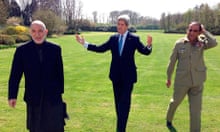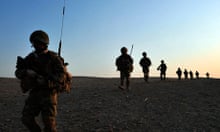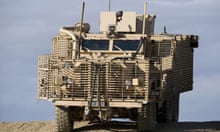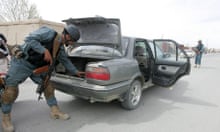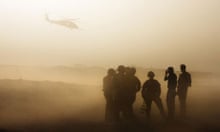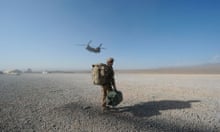David Cameron has said the government will "look carefully" at the use of heavily armoured vehicles after three British soldiers were killed in Afghanistan by a roadside bomb while travelling in a Mastiff troop carrier.
The prime minister paid tribute to the soldiers and said British troops have paid a "very high price" in Afghanistan.
Speaking on The World at One on Radio 4 on Wednesday, the prime minister said he had been told by troops on his recent visits to Afghanistan that they were satisfied with the equipment.
But asked whether it was necessary to look at the effectiveness of armoured vehicles, Cameron said: "That is right. We will want to look at that carefully. We have done an enormous amount to improve the quality and quantity of protective vehicles that our soldiers use out in Afghanistan.
"This particular vehicle, as I understand it, had a pretty good record of withstanding blasts from IEDs. So I am sure we will want to look at that carefully and put in place everything we can to make sure that our brave men and women have the best protective equipment."
The Ministry of Defence said on Wednesday the men had been killed on Tuesday in the Nahr-e-Saraj district of Helmand province, on the border of Kandahar just north of the provincial capital Lashkar Gah. The men were named as Corporal William Savage, Fusilier Samuel Flint and Private Robert Hetherington.
It is understood six other Britons were injured in the explosion, which happened while the soldiers were inside the Mastiff troop carrier – a 15-tonne vehicle which is regarded as one of the safest operated by the British military.
The soldiers who died were from the Royal Highland Fusiliers 2nd Battalion, Royal Regiment of Scotland, and can only have been in the country for a few weeks. The MoD said the injured men received immediate medical attention and were airlifted to the military hospital at Camp Bastion, but three could not be saved. Next of kin have been informed. The other soldiers hurt are not thought to have life-threatening injures.
The Mastiff is one of a number of fortified vehicles used by the British in Afghanistan that have helped to reduce the number of troops killed and injured by roadside improvised explosive devices.
Investigators will try to establish when the IED was planted – some incidents have involved devices planted years ago. This roadside bomb must have been on a huge scale to have caused such damage, officials noted.
Although the UK has handed over lead responsibility for fighting the Taliban to the Afghan national security forces, British troops are still providing support to the local army and police, often in mentoring and support roles.
Major Richard Morgan, spokesman for Task Force Helmand, said: "It is with deep sadness that I must confirm that three soldiers from The Royal Highland Fusiliers, 2nd Battalion The Royal Regiment of Scotland, have died after their vehicle was struck by an improvised explosive device in the Nahr-e Saraj district of Helmand province. Our thoughts and prayers are extended to their family and friends at this difficult time."
An MoD spokesman said the threats faced by our personnel as they continue to hand over security operations to their Afghan counterparts ahead of UK combat operations concluding by the end of next year," he said".
He added: "Security in Helmand, where most UK forces are based, is steadily improving with Afghan forces already responsible for the bulk of the province – but the environment in which our troops operate remains risky and dangerous, including the threat of improvised explosive devices and insurgent attack.
"We will continue to do all we can to minimise these risks but they can never be removed entirely."
The deaths take the number of UK service members who have lost their lives since operations in Afghanistan began in 2001 to 444. Six have died this year.
Tuesday's attack came on the third day of what the Taliban has called its spring offensive. Other explosions throughout the country killed nine civilians and a police commander.
The annual offensive was marked last year by a string of attacks around Kabul and across Afghanistan. This year's offensive, dubbed Khalid bin Waleed after the victorious general and companion to the Prophet Muhammad and nicknamed "the drawn sword of God", would consist of "special military tactics" and "insider attacks" to be carried out "in a systematic and coordinated manner", the Taliban announced in a statement.
"Similarly, collective martyrdom operations on bases of foreign invaders, their diplomatic centres and military airbases will be even further structured while every possible tactic will be utilised in order to detain or inflict heavy casualties on the foreign transgressors," they added.
The spring offensive coincides with the melting of winter snows, which opens passes across the Hindu Kush, affording insurgents greater mobility. At the same time, ill-equipped fighters, many without suitable clothing for winter warfare, can mobilise more easily.
General Mohammad Zahir Azimi, the spokesman for the Afghanistan Ministry of Defence, predicted more fighting this year.
"I see two reasons for this. First, the Taliban have gathered many fighters and we also have many soldiers." he said. "Secondly, with the American army pulling out of a fighting role, our soldiers will have to fight the Taliban."
A Nato spokesman said: "The Afghan people should not fear Taliban threats. The Afghan national security forces have wisely used the winter months to prepare for taking over the security lead throughout Afghanistan by mid-2013."
Georgette Gagnon, director of human rights for the UN mission in Afghanistan, said the number of civilians killed and wounded had increased by 18% compared with the first four months of 2012. So far in 2013, 682 civilians have been killed, compared with 550 in the same period last year 2012. The numbers for April are preliminary and are likely to rise.
"The UN is very concerned because the fighting season has just begun and already civilian casualties are rising, compared to the same period last year," said Gagnon.
This fighting season is a key test, as the international coalition is scheduled to hand over security responsibilities to Afghan forces next year.
